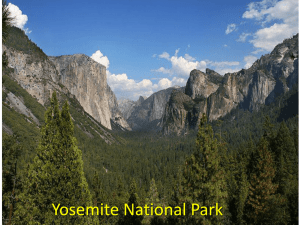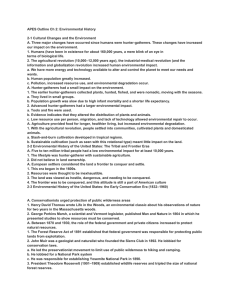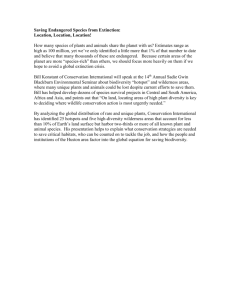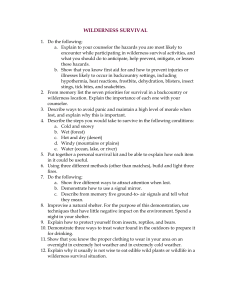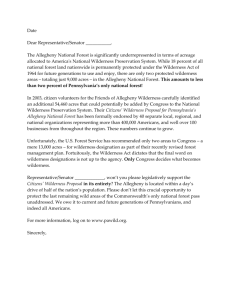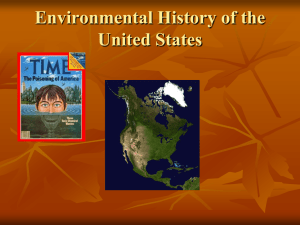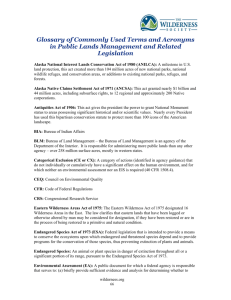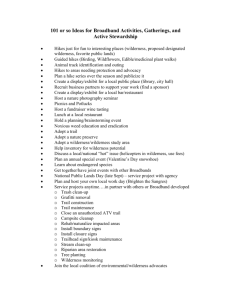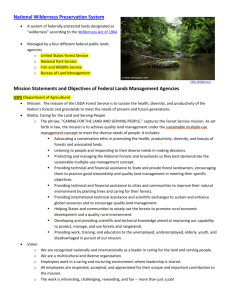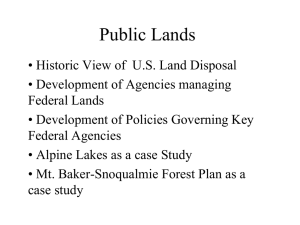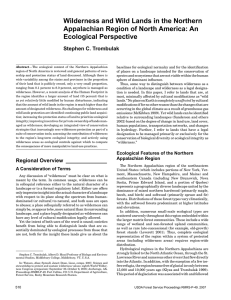WILDERNESS ACT OF 1964
advertisement
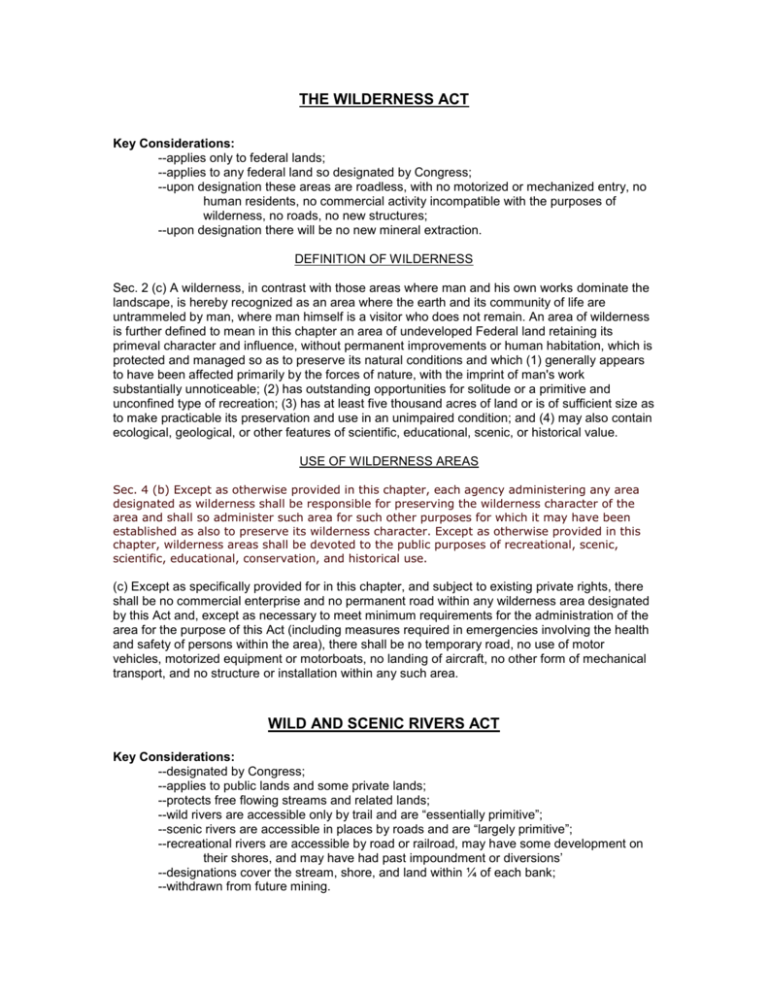
THE WILDERNESS ACT Key Considerations: --applies only to federal lands; --applies to any federal land so designated by Congress; --upon designation these areas are roadless, with no motorized or mechanized entry, no human residents, no commercial activity incompatible with the purposes of wilderness, no roads, no new structures; --upon designation there will be no new mineral extraction. DEFINITION OF WILDERNESS Sec. 2 (c) A wilderness, in contrast with those areas where man and his own works dominate the landscape, is hereby recognized as an area where the earth and its community of life are untrammeled by man, where man himself is a visitor who does not remain. An area of wilderness is further defined to mean in this chapter an area of undeveloped Federal land retaining its primeval character and influence, without permanent improvements or human habitation, which is protected and managed so as to preserve its natural conditions and which (1) generally appears to have been affected primarily by the forces of nature, with the imprint of man's work substantially unnoticeable; (2) has outstanding opportunities for solitude or a primitive and unconfined type of recreation; (3) has at least five thousand acres of land or is of sufficient size as to make practicable its preservation and use in an unimpaired condition; and (4) may also contain ecological, geological, or other features of scientific, educational, scenic, or historical value. USE OF WILDERNESS AREAS Sec. 4 (b) Except as otherwise provided in this chapter, each agency administering any area designated as wilderness shall be responsible for preserving the wilderness character of the area and shall so administer such area for such other purposes for which it may have been established as also to preserve its wilderness character. Except as otherwise provided in this chapter, wilderness areas shall be devoted to the public purposes of recreational, scenic, scientific, educational, conservation, and historical use. (c) Except as specifically provided for in this chapter, and subject to existing private rights, there shall be no commercial enterprise and no permanent road within any wilderness area designated by this Act and, except as necessary to meet minimum requirements for the administration of the area for the purpose of this Act (including measures required in emergencies involving the health and safety of persons within the area), there shall be no temporary road, no use of motor vehicles, motorized equipment or motorboats, no landing of aircraft, no other form of mechanical transport, and no structure or installation within any such area. WILD AND SCENIC RIVERS ACT Key Considerations: --designated by Congress; --applies to public lands and some private lands; --protects free flowing streams and related lands; --wild rivers are accessible only by trail and are “essentially primitive”; --scenic rivers are accessible in places by roads and are “largely primitive”; --recreational rivers are accessible by road or railroad, may have some development on their shores, and may have had past impoundment or diversions’ --designations cover the stream, shore, and land within ¼ of each bank; --withdrawn from future mining. NATIONAL WILDLIFE REFUGE SYSTEM ACT Key Considerations: --designated by the Interior Department; --purpose is to conserve fish and wildlife and their habitats; --covers areas for protection of fish and wildlife threatened with extinction, wildlife ranges, game ranges, wildlife management areas, waterfowl production areas; --compatible wildlife dependent recreation is the primary public use. NATIONAL CONSERVATION AREAS There is no organic act for national conservation areas hence each area is defined only by the terms of its specific legislation and the degree of protection may vary widely. NATIONAL PARK SERVICE The 1916 National Park Organic Act established the purpose of the system: “…to conserve the scenery and the natural and historic objects and the wild life therein and to provide for the enjoyment of the same in such manner and by such means as will leave them unimpaired for the enjoyment of future generations.” Parks are added to the system by Congress subsequent to a study conducted by the National Park Service. ANTIQUITIES ACT “…the President of the United States is hereby authorized, in his discretion, to declare by public proclamation historic landmarks, historic and prehistoric structures, and other objects of historic or scientific interest that are situated upon the lands owned or controlled by the Government of the United States to be national monuments, and may reserve as a part thereof parcels of land, the limits of which in all cases shall be confined to the smallest area compatible with proper care and management of the objects to be protected” NATIONAL FOREST MANAGEMENT ACT OF 1976 The National Forest Management Act requires the Secretary of Agriculture to assess forest lands, develop a management program based on multiple-use, sustained-yield principles, and implement a resource management plan for each unit of the National Forest System. FEDERAL LAND POLICY AND MANAGEMENT ACT OF 1976 The organic act for the Bureau of Land Management which manages approximately 12% of the United States. FLPMA requires: a) b) c) d) e) public lands be generally retained in Federal ownership; periodically and systematically inventories; management via a planning process with provision for public participation; which is guided by principles of multiple use and sustained yield permitted uses include grazing, mining, logging, recreation, and conservation of biological, archeological, historic, and cultural resources f) priority given to “areas of criticial environmental concern” g) an inventory for the establishment of wilderness study areas to be conducted within fifteen years of passage. The wilderness resource in these areas is to be protected until Congress votes on a designation. The BLM currently administers a program identifying Lands With Wilderness Character that contains provisions for managing some of the lands found to have that character.
